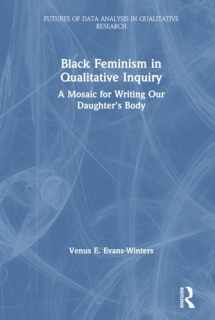
Black Feminism in Qualitative Inquiry (Futures of Data Analysis in Qualitative Research)
ISBN-13:
9781138486218
ISBN-10:
1138486213
Edition:
1
Author:
Venus E. Evans-Winters
Publication date:
2019
Publisher:
Routledge
Format:
Hardcover
156 pages
FREE US shipping
Book details
ISBN-13:
9781138486218
ISBN-10:
1138486213
Edition:
1
Author:
Venus E. Evans-Winters
Publication date:
2019
Publisher:
Routledge
Format:
Hardcover
156 pages
Summary
Black Feminism in Qualitative Inquiry (Futures of Data Analysis in Qualitative Research) (ISBN-13: 9781138486218 and ISBN-10: 1138486213), written by authors
Venus E. Evans-Winters, was published by Routledge in 2019.
With an overall rating of 4.1 stars, it's a notable title among other
books. You can easily purchase or rent Black Feminism in Qualitative Inquiry (Futures of Data Analysis in Qualitative Research) (Hardcover) from BooksRun,
along with many other new and used
books
and textbooks.
And, if you're looking to sell your copy, our current buyback offer is $0.3.
Description
Recently, Black women have taken the world stage in national politics, popular culture, professional sports, and bringing attention to racial injustice in policing and the judicial system. However, rarely are Black women acknowledged and highlighted for their efforts to understand the social problems confronting our generation and those generations that came before us. In the post-civil rights era, research faculty and theoreticians must acknowledge the marginalization of Black women scholars’ voices in contemporary qualitative scholarship and debates. Black Feminism in Qualitative Inquiry: A Mosaic for Writing our Daughter's Body engages qualitative inquiry to center the issues and concerns of Black women as researcher(s) and the researched while simultaneously questioning the ostensible innocence of qualitative inquiry, including methods of data collection, processes of data analysis, and representations of human experiences and identities. The text centers "daughtering" as the onto-epistemological tool for approaches to Black feminist and critical race data analysis in qualitative inquiry. Advanced and novice researchers interested in decolonizing methodologies and liberatory tools of analysis will find the text useful for cultural, education, political, and racial critiques that center the intersectional identities and interpretations of Black women and girls and other people of color. Daughtering as a tool of analysis in Black feminist qualitative inquiry is our own cultural and spiritual way of being, doing, and performing decolonizing work.


We would LOVE it if you could help us and other readers by reviewing the book
Book review

Congratulations! We have received your book review.
{user}
{createdAt}
by {truncated_author}


